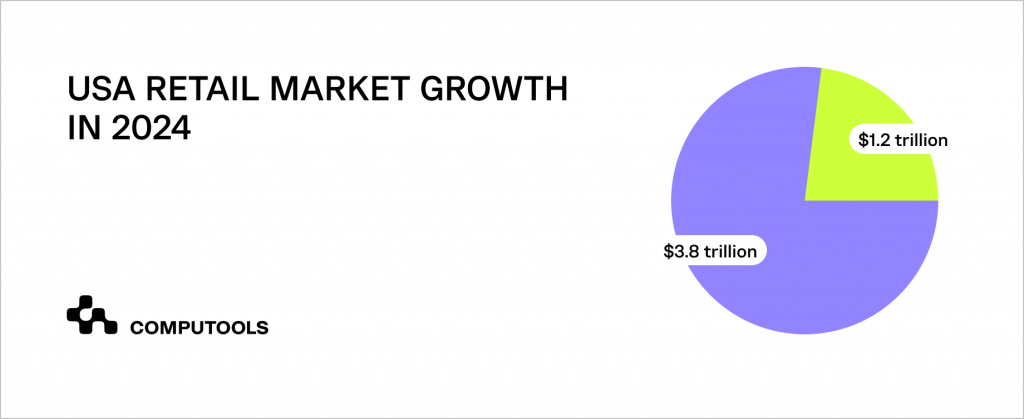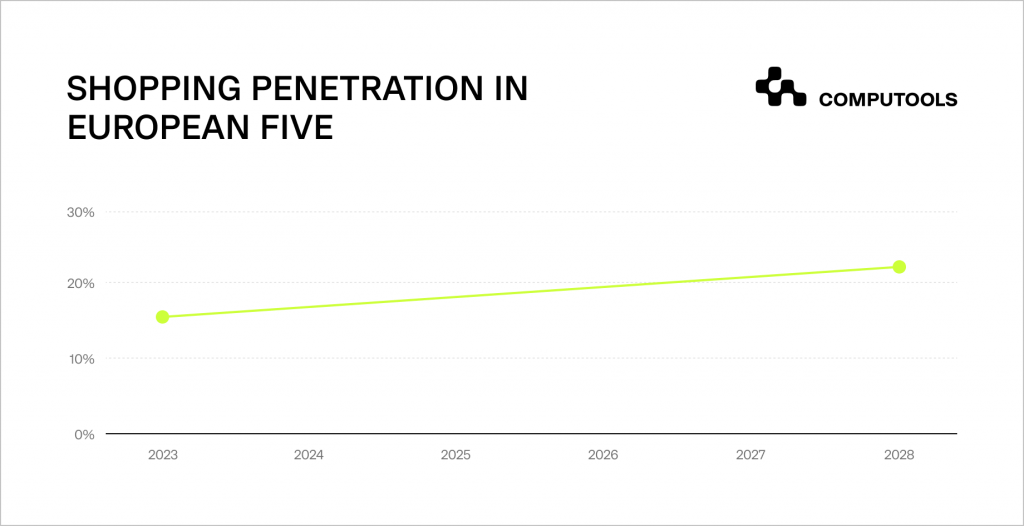Retail Market Overview
According to Forrester researchers, the total capital of the US specialty retail market by the end of 2023 was a staggering 4.8 trillion dollars, representing a 4% year-on-year growth.
For 2024, the picture looks the same, and it is expected to grow to 5 trillion dollars, with 3.8 offline and 1.2 trillion online.

Similarly, after a negative increase in 2020, retail sales in the European Five (Germany, the UK, France, Italy and Spain) grew significantly in 2021 and 2022.
They are expected to return to pre-pandemic levels in 2024. Online shopping penetration, which remained stable in 2023, is expected to increase from 16% in 2023 to 22% in 2028, with the UK leading the way.
Cumulative offline sales in Europe-5 are expected to reach €2.1 trillion by 2028.

Digital investments are crucial for both online and offline sales. Omnichannel experiences, combining physical and digital journeys, are proving to be the most effective approach as they foster customer loyalty.
Retail businesses should prioritise cultivating loyal customers who engage across multiple channels.
CX strategy & design services can help these loyal customers drive significant revenue and provide valuable insights for business growth.
Factors Influencing Specialty Retail
Building on the impressive growth of the retail market, we will discuss some key factors that will influence the success of specialty retail till 2025:
1. The Return Challenge
Returns are more frequent online than offline retailers, resulting in additional handling and logistics costs.
Retailers should improve product descriptions, offer more accurate size ranges, and ensure high-quality products to reduce the number of returns.
2. Security Concerns
Smash-and-grab scenarios, where goods are ripped out of storefronts and quickly taken away, are becoming increasingly common.
This increases security costs and damages the shop’s image. Implementing modern security technologies and improving the physical security of shops can help reduce the risk of such incidents.
3. Customer Loyalty
Customer loyalty depends significantly on retailers’ ability to implement software solutions and offer unique customer experiences.
Digitalisation allows you to collect data on purchasing behaviour, personalise offers, and increase customer satisfaction.
Companies ready for digital transformation gain a competitive advantage by creating closer and longer-lasting customer relationships.
Trends in Customer Experience for 2024 and Beyond
In this section, we examine the CX predictions shaping the future of specialty retail and explain why businesses should consider implementing them.
1. Customer experience
The retail customer experience trends have shifted, empowering customers who now value understanding and support over low prices or upgraded products.
Customer service has become crucial for lead conversion and loyalty, with empathy playing a key role in earning trust and satisfaction.
Companies must diversify communication channels, including instant messaging and social media, to meet customer expectations while integrating AI and chatbots to enhance service efficiency.
The well-being of customer service agents is essential as their performance impacts the overall customer experience.
2. Digital content
Retail content marketing plays a crucial role in this shift by engaging customers through various mediums such as blogs, social media, and newsletters, ultimately building trust and brand loyalty.
Effective content marketing strategies, like those employed by brands like Spotify and Canva, focus on adding value, leveraging social media, using email marketing, optimising for mobile, and engaging in influencer marketing to connect with and retain customers.
3. Smooth return
Retailers like H&M and New Look are introducing fees for online returns to mitigate the high costs and environmental impact of reverse logistics.
This shift has prompted technological innovations, such as custom software development of sizing calculators, digital avatars, and advanced analytics, to reduce return rates by helping consumers make better purchase decisions.
Additionally, logistics and supply chain companies are focusing on optimising the returns process through better inventory management and efficient transportation, aiming to cut costs and carbon emissions while improving customer satisfaction.
4. AI analysis of customers and their journey
Integrating artificial intelligence and video analytics reshapes the retail industry, enabling deep analysis of customer behaviours and preferences.
AI-powered behavioural analysis is pivotal in understanding customer insights, allowing retailers to effectively tailor campaigns and predict future shopping behaviours.
Various factors, including market conditions, social status, income, and psychological elements, influence customer behaviour in specialty retail.
Leveraging AI and customer insights, retailers can personalise shopping experiences, refine product offerings, and drive sales and customer loyalty through data-driven decision-making.
5. Virtual or augmented reality
Augmented and virtual reality (AR/VR) technologies significantly benefit the retail industry, enhancing product visualisation, increasing customer engagement, and providing cost-effective marketing software solutions.
AR enables customers to try on virtual clothes, visualise furniture in their homes, and preview makeup products, leading to more confident purchasing decisions and reduced returns.
VR can be utilised for employee training, allowing retail workers to learn on the job through interactive simulations.
At the same time, 360° videos offer immersive experiences for showcasing products and spaces without the need for specialised headsets.
6. Biometrical pass for offline stores
Biometric technologies like facial recognition are increasingly integrated into offline retail to address various challenges, including theft prevention, customer analytics, and enhancing loyalty programs.
By leveraging facial biometrics, retailers can create centralised databases of known shoplifters, automate security notifications, and improve response times to incidents, thereby enhancing overall store security and reducing losses due to theft and plunderage.
Additionally, facial biometrics enable retailers to gain deeper insights into customer demographics, behaviour, and preferences, allowing for more targeted marketing efforts, personalised services, and improved customer experiences, all without significant additional infrastructure costs.
7. QR-codes
QR codes can bridge the gap between physical and online stores. If a desired item is out of stock, customers can scan a code to be directed to the online store and purchase it for delivery.
QR codes can offer special promotions, discounts, and loyalty program rewards. This personalises the shopping experience and incentivises customers to purchase more.
Every time customers scan a QR code, retailers gain valuable data about their shopping habits and preferences. This allows them to optimise store layout, product placement, and marketing strategies.
QR codes can link to information about product origins, manufacturing processes, and sustainability practices. Therefore, it builds trust with customers who are increasingly concerned about these factors.
Our Comprehensive Approach to CX Predictions
These CX predictions are based on Forrester’s analysis of current trends, consumer behaviour and technology innovation.
We also observe the market and competition for forecasting and observe from our projects. In addition, some factors interact and influence each other to form general trends and forecasts in e-commerce.
For example:
• New technologies such as artificial intelligence, machine learning, augmented reality and blockchain and web development services are changing how we do business and interact with customers.
These technologies affect the personalisation, automation, and security of purchases.
• Analysing consumer behaviour, including preferences, habits, and needs, allows us to predict retail customer experience trends.
A large amount of customer data helps us better understand the market and adapt strategies.
• The economic situation worldwide and in individual countries affects consumer spending power. Economic growth or decline can affect spending on online shopping.
• Regulations and new laws related to e-commerce, data protection and consumer protection affect how companies do business.
• Trends are also shaped by competitors’ actions, new market entrants, and strategies. Businesses are watching their competitors to stay relevant and competitive.
• Changes in lifestyles, cultural influences and social trends also shape consumer preferences. For example, the growing popularity of eco-friendly products or the healthy lifestyle movement.
• Improvements in logistics and infrastructure, such as fast delivery and the development of digital payments, are affecting the convenience and speed of online shopping, driving the growth of e-commerce.
To grow your business and stay current with trends, contact us at info@computools.com. We can help you implement reliable software solutions and improve customer experience.
Computools
Software Solutions
Computools is an IT consulting and software development company that delivers innovative solutions to help businesses unlock tomorrow.









“Computools was selected through an RFP process. They were shortlisted and selected from between 5 other suppliers. Computools has worked thoroughly and timely to solve all security issues and launch as agreed. Their expertise is impressive.”